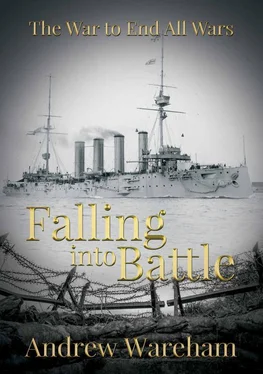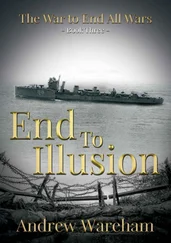“Take a while to bring artillery around those slagheaps, Baker. The two nearest bridges, left and right, have been broken. Only a matter of time before we are flanked, of course, but it might be days rather than hours this time. I’ve sent runners back to try to locate Brigade. We are short of rounds.”
“We are down to fifteen per man, sir.”
“Best you should pull back, Mr Baker. Too few of you left to make a great difference now. You have done your work, sir. My messengers have reported your presence and your actions over the last weeks, by the way. I know your Captain Platt did the same.”
Richard could not discover any significance to that comment, merely nodded his appreciation.
“Thank you, Major. Southwest or due west would you recommend, sir?”
“There’s a made road a hundred yards or so south of here. Easier to march on and leading almost west. I would follow that, towards the sea. I shall bring my men that way if we have to fall back.”
“Not a great deal of cover, sir.”
“No. Not ideal country for a retreat.”
The low hills were open, bare grazing land, empty of animals now.
“D Company will march, Sergeant Grace!”
Richard saluted Major Higgins-Hall and followed the attenuated company as Sergeant Grace called the march.
Two hours later, five weary miles down the road, they met a troop of cavalry, dragoons with straight swords and carbines.
“Who are you?”
The captain was dressed very fine, still in his peacetime uniform, all lace and braid.
“D Company, Third Bedfordshires.”
“Which platoon?”
“We are the whole company, sir. Lieutenant Baker in command.”
The captain scowled as he realised the implications of Richard’s statement.
“What’s behind you?”
“Lancashire Fusiliers are holding a canal, maybe five miles distant. They are short of ammunition and have lost three hundred men. German infantry is in massive strength to their front. Major Higgins-Hall ordered us back as we are down to fifteen rounds.”
“Too few of you to make a difference as well. How did you get separated from your battalion?”
“The battalion was pushed southeast, sir. We held a sunken lane and a small copse while they shifted position.”
“Did you, by God! Well done. There is no line hereabouts. You are no more than ten miles from the sea and the bulk of the BEF. Your best course might be to continue on this road. There is a battalion making its way towards you and they will be able to provide for you. I shall take my troop to the support of the Fusiliers.”
“Thank you, sir. There is at least a division of German infantry pushing through the slagheaps to the north. We held for some days there but there are too many of them and they seem willing to take huge losses to gain ground.”
“Bloody Huns for you! You have done all you can, Mr Baker. Go back now.”
Not a boast and nothing but the most precise truth, Richard reflected, but it had done his name no harm at all. He hoped the captain survived to tell the tale.
Another hour and they met a battalion of Devons marching north hopefully. They were newly landed within the previous two days and were anxious to meet the Hun. Richard wished them luck. Their colonel was shocked at the condition of Richard’s company and amazed that he was carrying a rifle.
“Not quite the thing for an officer, old boy!”
“We needed the extra rifle, sir. Lost so many men that every one of us counted.”
“Oh! I see! Where did you say the rest of the company was?”
“Dead, sir.”
“All of them?”
“I believe so, sir. A few walking wounded were sent south, but we have heard nothing of them.”
He repeated the story that the remainder of the battalion had been pushed southeast, implying again that they had stood rearguard. He comforted himself that, in effect, they had.
“Divisional HQ is about eight miles southwest of here, Baker. We have a wagon going back this afternoon, as soon as its stores are used up… Steam lorry, in fact, one of the Fodens. Best thing will be for you and your men to go on that – you don’t seem to have a lot of marching left in in you.”
“The men are tired, sir. They would certainly be better for transport. Be better still for a chance to clean up, sir. Days holding the line in filthy slagheaps has left us in disgusting condition, sir.”
“Nonsense, man! Can’t be held responsible for a bit of dirt in the field. You should have seen the state we got into in South Africa! Let me put you in the hands of the adjutant.”
Evening saw them at the coast, deposited outside the tents of a division and under the eye of a major-general.
“Who are you? Can’t see a badge or anything under the dirt!”
“D Company, Third Beds, sir. Lieutenant Baker.”
“Oh! Is that who you are! Heard about you, young man! Get yourself to the mess tent – none of your battalion here but you can use HQ facilities.”
The general gestured to a staff officer, ordered him to arrange proper messing for the company. Richard watched as the captain turned to a lieutenant who called to a sergeant who found a corporal to lead the company to ablutions and then to a mess tent.
“You, Mr Baker, can come this way.”
An orderly led Richard to a tent and provided soap and hot water followed by a clean uniform, shirt and underclothes and stockings of about his size.
“Captain Grubb, sir, he supplied it. Said you was welcome to his spare uniform, sir. Got a razor, too.”
Richard washed thoroughly, only realising just how much he stank after he had cleaned up.
“I don’t know if you can do anything with my own uniform, soldier.”
“Yes, sir. Burn it, sir.”
“You may well be right. Let me just get hold of my paybook and other papers.”
“Yes, sir. I’ll check your pockets for you, sir. Not to worry, sir. Your stuff will be safe, sir. General said you was to come to the mess, sir.”
“Come in, Lieutenant Baker. I have sent a report to Calais that you have survived and have managed to bring in some of your company as well. Should hear from them within the hour, I would expect. Your story reached London two days ago, I am told. Sort of thing we want to hear, old chap. For the moment, you must be hungry!”
“I suppose I am, sir. Haven’t really had much to eat for some days, now, not since we managed to cobble together a bit of a stew at the mining village, after we blew the bridge there which gave us a few hours to sit down and eat.”
Again, it was almost true and contained nothing of an actual lie.
“Heard about that! Used the black powder from the colliery, so they said. Sit down man, get some food into you!”
The general ate well, it seemed - steak and fresh vegetables followed by some sort of sweet pudding, accompanied by a glass of wine.
“Brandy, Baker?”
“Thank you, no, sir. Tired as I am, I don’t think that would be wise. Have my men eaten, sir?”
“Washed; issued with new uniforms; fed a solid meal – no need for you to worry about them Baker, although very right that you should. Good men!”
“The best, sir. A good half of them Territorials, like me, called up to serve the King, sir. Both corporals are Terriers, sir.”
“That I would not have believed if I had been told it, Baker. Damned fine men!”
Richard considered his response.
“I am very proud of them, sir.”
“So you should be, man!”
He had got that right, it seemed. He wasn’t sure, but there might have been a tear in the general’s eye.
A Rolls-Royce staff car pulled up a little later, bringing a captain and orders.
The general brought the staff officer to Richard.
“Your battalion is in camp outside Calais, Mr Baker, all that remains of it. You are to join them temporarily but will be sent back to depot in Bedford to pick up men for your company. Sleep here tonight. Transport for you and your men will be provided in the morning.”
Читать дальше












